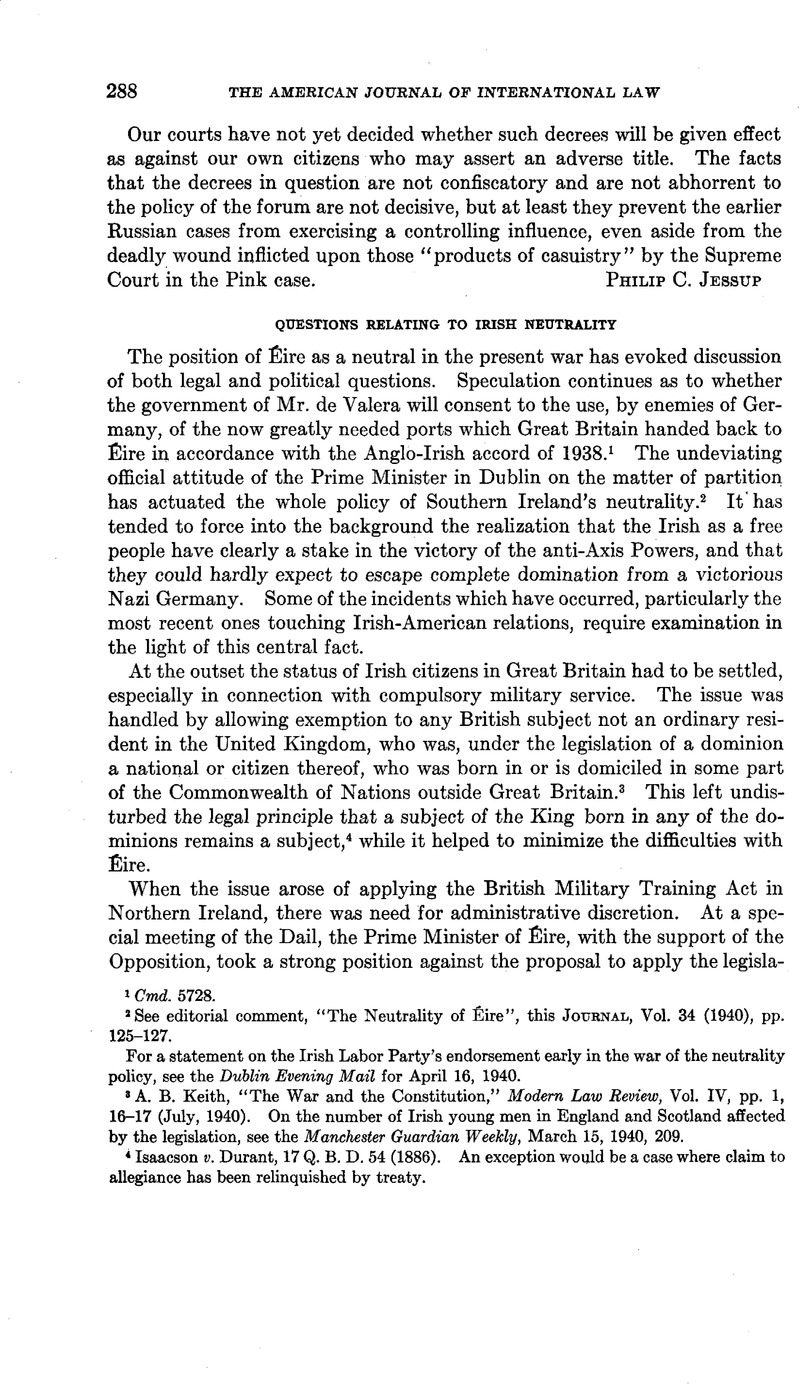No CrossRef data available.
Article contents
Questions Relating to Irish Neutrality
Published online by Cambridge University Press: 12 April 2017
Abstract

- Type
- Editorial Comment
- Information
- Copyright
- Copyright © American Society of International Law 1942
References
1 Cmd. 5728.
2 See editorial comment, “The Neutrality of Eire”, this Journal, Vol. 34 (1940), pp.125–127.Google Scholar
For a statement on the Irish Labor Party’s endorsement early in the war of the neutrality policy, see the Dublin Evening Mail for April 16, 1940.
3 Keith, A. B., “The War and the Constitution,” Modern Law Review, Vol. IV, pp. 1,16–17 (July, 1940). On the number of Irish young men in England and Scotland affected by the legislation, see the Manchester Guardian Weekly, March 15, 1940, 209.Google Scholar
4 Isaacson v. Durant, 17 Q. B. D. 54 (1886). An exception would be a case where claim to allegiance has been relinquished by treaty.
5 Parl. Deb., 5th Series, Vol. 371, p. 1718.Google Scholar
6 Keith, A. B., loc. cit.Google Scholar
7 Manchester Guardian Weekly, Oct. 4, 1940, p. 236 Google Scholar; Jan. 24, 1941, p. 61.
8 Dublin Evening Mail, April 30, 1940. Twenty-one months later, when the Irish Republican Army was accused in the Dail, on Jan. 28, 1942, of collaborating with German agents dropped in Eire by parachute, Mr. de Valera said that if proof could be obtained the charge would be one of high treason. Manchester Guardian Weekly, Jan. 30, 1942, p. 68.
9 Manchester Guardian Weekly, Jan. 10, 1941, p. 25.Google Scholar
10 Ibid., June 27, 1941, p. 450.Google ScholarPubMed
11 Ibid., Nov. 15, 1940, p. 349; Nov. 22, 1940, p. 375. See, in this connection, the Toronto Daily Star, Nov. 20, 1940, at p. 19.
12 Manchester Guardian Weekly, May 23, 1941, p. 370.Google Scholar
13 Ibid., Jan. 30, 1942, p. 68.
14 Ibid., July 25, 1941, p. 49.
15 The Times (London), Feb. 11, 1942, p. 2; New York Times, Feb. 20, 1942, p. 5.Google ScholarPubMed
16 Arms, W. T. in New York Times, Feb. 8,1942, IX, p. 12 (reporting a relay by the B.B.C.from Dublin).Google Scholar
17 An English observer has tried to draw an analogy between the situation as to Ireland and that in India, in the sense that the form of freedom or self-government in one section of the latter country might be quite unacceptable to other sections. Norman Angell, in New York Times, March 1, 1942, E, 6.


